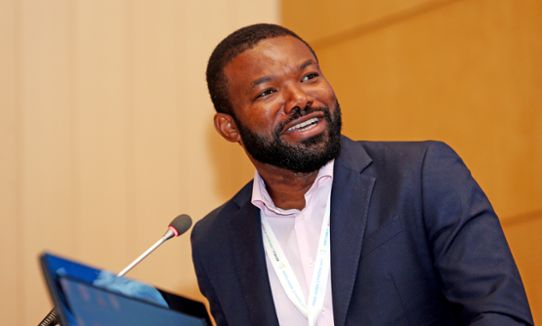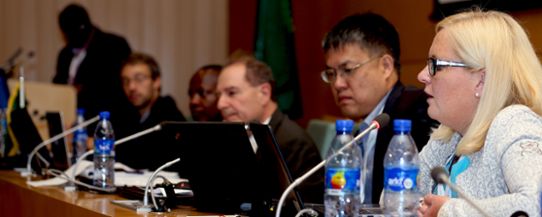The Forum, a first of its kind, brought together over five hundred participants including African leaders from governments, public and private sectors, civil society, and development partners who share the opinion that improved weather, water, and climate services, known collectively as hydromet, could reduce losses due to weather related disasters and improve African economies.
The goal of the meeting was to jointly seek ways of improving hydrological, meteorological and early-warning services in Africa to achieve climate and disaster resilience towards the fulfilment of the larger sustainable development strategies and frameworks.
SMHI at the conferece
SMHI participated in the event which also attracted weather and climate services from Europe and around the globe, such as the UK Met Office and the KNMI. The World Bank, one of the event’s main organizers tasked SMHI with moderating a crucial plenary session on Wednesday 13 September, titled The Role of Hydromet Services in Implementing the Paris Agreement, Agenda 2030 and the Sendai Framework on Disaster Risk Reduction in Africa.
The panel of discussion, moderated by SMHIs Bode Gbobaniyi, consisted of distinguished panelists from the UNDP, WMO, International Federation of Red Cross and Red Crescent (IFCR), ACPC, UNSIDR and the World Bank. The panel examined how weather, climate and hydrological services would contribute to the development goals set out in these frameworks. Opportunities and gaps to utilize hydromassage services in the implementation of these agreements and the importance of capacity development for National hydrometeorological services (NMHS) in their roles as primary water and climate informers. They also discussed the need for national and regional collaboration and coordination, and how to finance initiatives.

- I had the privilege of moderating at the forum. The discussions gave me a deeper appreciation of the existing developmental gaps and how crucial it is to build capacity toward finding lasting solutions. There is so much we can offer in this regard, given the right support, says Bode Gbobaniyi.
Eleonor Marmefelt, head of SMHI Capacity Development was one of the distinguished panelists in another plenary session titled “Cooperation and sharing knowledge - Role of development and technical partners” which included speakers from the WMO Climate Risk and Early Warning Services (CREWS) Secretariat, East African Community (EAC), China National Meteorological Centre (CNMC), AFD, and the US National Oceanic and Atmospheric Administration ( NOAA).

In the panel discussion, moderated by James Kiyangi of the African Development Bank (AFDB), the invited speakers discussed recent successful cooperation and knowledge sharing initiatives, reflected on how these initiatives can be reinforced and better prioritized. They also discussed cooperation and knowledge sharing beyond the need for more resources.
SMHIs contributions and cooperations
SMHI has a wide range of expertise and tools to strengthen capacity of sister organizations in developing countries for the provision of crucial water and climate information services. SMHI cooperation initiatives such as are targeted towards building capacity of local and national actors to work towards sustainable management and use of common ecosystem services and natural resources, leading towards increased resilience against climate change and weather related disasters, including capacity for food security.
Conclusion
SMHI is fast becoming a well-recognized and sought after actor in capacity development efforts in water and climate information services in Africa. Participation in forums such as this is crucial for continued visibility, cooperation and synergy between us and all other development partners, donors international and regional actors as well as sister organizations across the continent.
All in all, the event was quite successful and paves the way for future engagements in developing and sustaining a robust hydromet services framework for the continent.